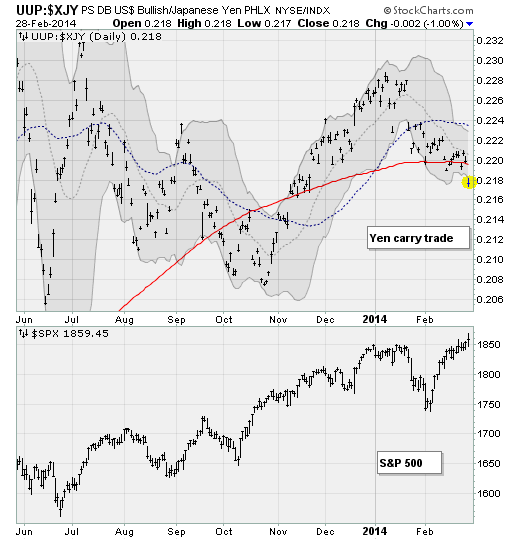Why you must pay attention to the yen and yuan
Russian incursions into the Crimea aside, the main thing investors need to pay attention to in the days to come are the vagaries of the currency market. In particular, the movements of the Japanese yen and China's yuan will determine, in large part, whether stocks can continue to push deeper into record territory -- or fall away in a repeat of the volatility and panic we saw back in January.
To understand why, you need to understand how important the currency "carry trade" has become. This is where hedge funds and other institutional investors use major shifts in currency values, relative to each other, to bolster profits. This has been amped up in recent years because of the flood of cheap money currency from the major central banks.
It works something like this: An investor borrows money in a currency where it is cheap and uses that to buy assets in a more highly valued currency. Not only do you get the profit from the rise in the value of the asset purchased, but you also get the gain from the currency effect (both the drop in the weak currency and the rise in the stronger currency).
For a while now, the trade frequently used U.S. dollars and the Japanese yen as funding currencies, and the Chinese yuan (and other emerging market currencies, such as Indonesia's rupiah) as the targets. The result has been a flood of so-called "hot money" inflows into these target countries, which has fueled a rise in financial assets and spurred a lending boom.
In fact, since the 2008 financial crisis China's banking system has grown by more than $15 trillion to roughly $24 trillion, an increase that's larger than the entire U.S. banking system.
Some U.S. investors have benefited from carry trades, using the yen as a funding currency to play the stock market her at home. That's why, on most days, the stock market follows the yen/dollar exchange rate tick-for-tick.
In January, when emerging market assets and currencies were under pressure, the selloff in U.S. equities was magnified by a drop in the yen carry trade. Stabilization in the yen carry in recent weeks has allowed the S&P 500 to push to new record highs.
But things are changing now.
For one, the Japanese yen is starting to break higher out of its month-long consolidation range as the U.S. dollar breaks down, putting new pressure on yen carry trade positions. The catalyst for this seems to be the flow of poor U.S. economic data and an increase in Japanese inflation, suggesting that the Federal Reserve could, on a relative basis, be more stimulative in coming months than the Bank of Japan is.
Two, in an effort to get control of unsustainable growth in banking assets and perhaps to reinvigorate an economy suffering from softer-than-usual GDP growth, Beijing has started pushing its currency lower on a scale that hasn't been seen since 2008. We could be seeing the resurrection of China's currency devaluation strategy -- as a way of juicing exports -- that it has frequently relied upon.
The trouble is that so many investors have grown complacent and assumed that the yen will keep falling against the dollar and that the yuan would keep rising against the dollar. Large bets have been placed on these movements in the derivatives markets, by speculators, banks and industrial companies looking to hedge against currency movements. Should these unexpected currency moves continue, these derivative positions will start showing losses in a hurry.
Moreover, a drop in the yuan will suck capital out of China and worsen a vulnerable credit situation there, as interest rates drift higher. This week saw inter-bank lending rates in China drift to record highs above government bond yields in a sign that cash is becoming scarce.
How big is the problem? Deutsche Bank Asia currency strategist Perry Kojodjojo estimates that corporate U.S. dollar/Chinese yuan short positions total some $500 billion.
For now, I continue to recommend that investors avoid, or short outright, emerging market stocks with a particular focus on China, as currencies look ready to return to the spotlight in March. I've recommended the ProShares UltraShort China (FXP), and have added the position to my Edge Letter Sample Portfolio.
For everyone else, stay cautious and keep an eye on currency values in the weeks to come.Disclosure: Anthony has recommended FXP to his clients.
Anthony Mirhaydari is founder of the Edge and Edge Pro investment advisory newsletters, as well as Mirhaydari Capital Management, a registered investment advisory firm.

